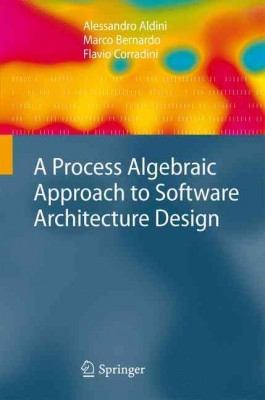| A Process Algebraic Approach to Software Architecture Design 2010 Edition Contributor(s): Aldini, Alessandro (Author), Bernardo, Marco (Author), Corradini, Flavio (Author) |
|
 |
ISBN: 184800222X ISBN-13: 9781848002227 Publisher: Springer OUR PRICE: $52.24 Product Type: Hardcover - Other Formats Published: November 2009 Annotation: The design and the verification of modern software applications requires the analysis of several different aspects, such as software correctness, quality of service, and security, and of the possible inter-relations among them. Process algebraic architectural languages and the related analysis techniques provide a formal paradigm that allows for the modeling and analysis of such systems and of the related properties during the early stages of the design process. The book presents such a paradigm in a novel way that privileges the discussion of its foundational characteristics and then introduces a number of guidelines, integrated with ad-hoc methodologies and exemplifying case studies, to support the practical benefits of using such a paradigm. The book can be of help for both researchers and graduate students who intend to approach the process algebraic formal paradigm and for the practitioners who intend to apply the related approach to software design and verification. |
| Additional Information |
| BISAC Categories: - Computers | Software Development & Engineering - Systems Analysis & Design - Computers | Hardware - Mobile Devices |
| Dewey: 005.1 |
| LCCN: 2009931044 |
| Physical Information: 0.75" H x 6.14" W x 9.21" (1.38 lbs) 322 pages |
| Descriptions, Reviews, Etc. |
| Publisher Description: Inthe?eldofformalmethodsincomputerscience, concurrencytheoryisreceivinga constantlyincreasinginterest.Thisisespeciallytrueforprocessalgebra.Althoughit had been originally conceived as a means for reasoning about the semantics of c- current programs, process algebraic formalisms like CCS, CSP, ACP, ?-calculus, and their extensions (see, e.g., [154,119,112,22,155,181,30]) were soon used also for comprehendingfunctionaland nonfunctionalaspects of the behaviorof com- nicating concurrent systems. The scienti?c impact of process calculi and behavioral equivalences at the base of process algebra is witnessed not only by a very rich literature. It is in fact worth mentioningthe standardizationprocedurethat led to the developmentof the process algebraic language LOTOS [49], as well as the implementation of several modeling and analysis tools based on process algebra, like CWB [70] and CADP [93], some of which have been used in industrial case studies. Furthermore, process calculi and behavioral equivalencesare by now adopted in university-levelcourses to teach the foundations of concurrent programming as well as the model-driven design of concurrent, distributed, and mobile systems. Nevertheless, after 30 years since its introduction, process algebra is rarely adopted in the practice of software development. On the one hand, its technica- ties often obfuscate the way in which systems are modeled. As an example, if a process term comprises numerous occurrences of the parallel composition operator, it is hard to understand the communicationscheme among the varioussubterms. On the other hand, process algebra is perceived as being dif?cult to learn and use by practitioners, as it is not close enough to the way they think of software systems. |